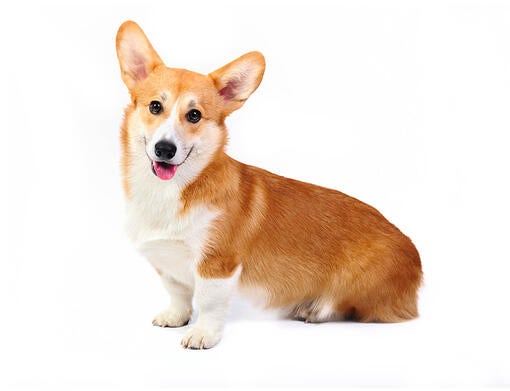
Welsh Corgi (Pembroke)
Short, sturdy and low to the ground, the Pembroke Welsh Corgi has an attractive foxy face. Their straight, medium length coat has a dense undercoat and is never soft, wavy or wiry.
The need-to-know
- Dog suitable for experienced owners
- Some training required
- Enjoys gentle walks
- Enjoys walking an hour a day
- Small dog
- Minimum drool
- Requires grooming every other day
- Non hypoallergenic breed
- Quiet dog
- Guard dog. Barks and alerts
- May require training to live with other pets
- May require training to live with kids
Personality

Devoted and affectionate to their owners, they can sometimes be fairly disinterested in strangers. Generally obedient and active, whilst small in height this should properly be considered a larger dog on very short legs rather than a little dog. Bold and outgoing, friendly and loyal, they make excellent watchdogs and suit an active home. Keep in mind their livestock driving ancestry, which has been known to mean groups of people, particularly children, are herded together regardless of their wishes!
History and Origins

Country of Origin: Wales
The Pembroke Corgi, made famous by Queen Elizabeth II is a long, low, cattle herding dog, thought to have been brought to Wales by the Flemish weavers. Their job originally was to drive cattle from one location to another, a job which requires a strong character and a great deal of stamina. The cattle they would have worked would be small, feisty hill cattle, and the distances involved could take days to cover, make no mistake this is a hard worker! Originally considered one breed, the Pembroke and Cardigan Corgis were split and recognised separately in 1934.
Nutrition and Feeding

Your dog's diet needs to have the right balance of all the main nutrient groups including a constant supply of fresh water. It's important to conduct regular body condition scores to ensure you keep your dog in ideal shape and remember to feed him at least twice daily and in accordance with the feeding guidelines of his particular food.
Exercise

Bred to walk or trot miles and be willing to deal with stroppy cattle, the Pembroke Corgi has plenty of stamina. An hours exercise per day at the very least, ideally more, will suit the Pembroke well. If you have nothing for your Pembroke to herd, consider activities such as ‘Treiball’ or ‘sheep ball’ where the dog herds large inflatable exercise balls. Whilst the Pembroke won’t make a great running partner, they will ideally suit those who enjoy long country walks or rambles.
Other Information

Health and common issues
The Pembroke Welsh Corgi is generally a very hardy breed. As with many breeds though, they can suffer from hereditary eye disorders and hip dysplasia (a condition that can lead to mobility problems). Eye testing and hip scoring of dogs prior to breeding is therefore important. Their body shape also makes them more prone to spinal disc disease. The breed club monitor the health of the breed carefully and should be contacted for the most up-to-date information and details of any DNA or additional testing they recommend. Breed Clubs can be found on the Kennel Club website.
Space requirements
Pembroke Corgis don’t require a huge amount of space, but a secure garden is important, they are more than capable of digging under fencing or squeezing through small gaps. Due to their long body and short legs, they should avoid using stairs as puppies and only use them minimally as adults. Suitable for town or country but remember they will alert vocally, so consider if this will irritate those living in close proximity.
Training welsh corgi (pembroke)
With the right motivation of treats, toys and opportunity to herd things the Pembroke Corgi can be a fun dog to work with. A sense of humour is required and their short-legged, long backed physique will rule out some activities, but they have excellent brains, which need to be kept occupied with a variety of training games and puzzles.
Best family dog breeds
While a good family dog with older children, the Pembroke Corgi is inclined to herd and to nip at the heels of anyone who doesn’t wish to be herded. This can cause issues with very small children who won’t understand or be able to react appropriately – or with those who tend to be over active and run about a lot! Otherwise, the Pembroke Welsh Corgi makes an excellent family pet for those with a suitably active lifestyle. While many dogs are traditionally thought of as being good with children, all dogs and children need to be taught to get on with and respect each other, and be safe together. Even so, dogs and young children should never be left alone together and adults should supervise all interactions between them.
Did you know?
- Legend has it that the Pembroke Corgi is an enchanted dog, used by the Welsh fairies and elves to pull fairy coaches, work fairy cattle and serve as steed for the fairy warriors. It is said those with keen eyes and understanding hearts can still the faint marks of the fairy saddle over their shoulders.
- Queen Elizabeth II met her first Corgi when she was a child, King George VI brought home a male puppy named Dookie in 1933. After the introduction of a second Corgi, Jane, they had a litter of puppies, and thus began the Corgi tradition within the royal family.
- To this day Pembroke Welsh Corgi’s are excellent herding dogs and still compete in AKC Herding competitions. There are two possible reasons behind their name. The first is that “cor” is Welsh for watch other/gather and “gi” means dog. However, others have interpreted “cor” to mean Dwarf. A Pembroke Welsh Corgi called Rufus was the unofficial mascot for Amazon. Owned by the editor-in-chief and principal engineer, Rufus attended work with his owner every day.